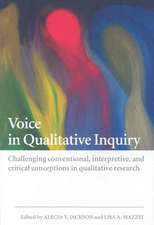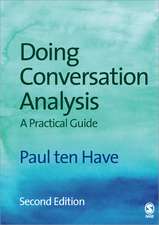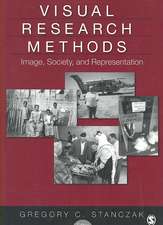Epistemology and Metaphysics for Qualitative Research
Autor Tomas Perneckyen Limba Engleză Paperback – 5 oct 2016
In a clear, easy to follow style, the reader is guided through an array of concepts that are defined, explained and made simple. With the aid of helpful examples and case studies, the book challenges the prevailing modes of thinking about qualitative inquiry by showcasing an immense variety of philosophical frameworks. Armed with a strong understanding of this philosophical backbone, students will be able to choose and defend a ‘pick and mix’ of research methods that will uniquely complement their research.
- Empiricism
- Rationalism
- Realism
- Skepticism
- Idealism
- Positivism
- Post-positivism
- Idea-ism
- Hermeneutics
- Phenomenology
- Social Ontology
- Quantum Mechanics
| Toate formatele și edițiile | Preț | Express |
|---|---|---|
| Paperback (1) | 333.78 lei 3-5 săpt. | +21.81 lei 6-12 zile |
| SAGE Publications – 5 oct 2016 | 333.78 lei 3-5 săpt. | +21.81 lei 6-12 zile |
| Hardback (1) | 979.08 lei 3-5 săpt. | |
| SAGE Publications – 5 oct 2016 | 979.08 lei 3-5 săpt. |
Preț: 333.78 lei
Nou
Puncte Express: 501
Preț estimativ în valută:
63.87€ • 66.25$ • 53.26£
63.87€ • 66.25$ • 53.26£
Carte disponibilă
Livrare economică 06-20 martie
Livrare express 19-25 februarie pentru 31.80 lei
Preluare comenzi: 021 569.72.76
Specificații
ISBN-13: 9781446282397
ISBN-10: 1446282392
Pagini: 248
Dimensiuni: 170 x 242 x 14 mm
Greutate: 0.43 kg
Ediția:First Edition
Editura: SAGE Publications
Colecția Sage Publications Ltd
Locul publicării:London, United Kingdom
ISBN-10: 1446282392
Pagini: 248
Dimensiuni: 170 x 242 x 14 mm
Greutate: 0.43 kg
Ediția:First Edition
Editura: SAGE Publications
Colecția Sage Publications Ltd
Locul publicării:London, United Kingdom
Recenzii
An astonishing contribution! Pernecky’s lucid, engaging treatment of this complex subject matter renders centuries of challenging philosophical argumentation accessible and valuable to students and seasoned qualitative researchers alike. This is a work that will explode stereotypes and make you rethink the paradigms you thought you knew.
A highly relevant book that underlines how epistemology, philosophy and metaphysics work at the heart of research processes. In a post-paradigmatic perspective, it places a salutary emphasis on the diversity of ideas, theories and schools of thought which encourages academic freedom, creativity and interdisciplinary openness.
I have searched for years for the “perfect” book for my PhD-level Philosophy of Science course and I have now found it. Pernecky presents a cogent and clear understanding of the Philosophy of Science, equally accessible to undergraduate and graduate students. Written from a lens of qualitative research, the text provides an objective and dispassionate treatment of competing streams of thought converging to inform qualitative data analysis; in doing so it also gives a clear understanding of positivism, rationalism, and other modes of thought characterizing the methodological debate between qualitative ad quantitative orientations. The book will give students and academics alike an appreciation for competing orientations reflecting the underlying metatheoretical assumptions informing the construction of knowledge, whether qualitative, quantitative, or theoretical.
This is an enormously important work. Qualitative inquiry is burgeoning throughout the social sciences, and with significant challenge to the logical empiricist orientation that has long dominated the sciences. Yet, while a challenge to tradition, there are scant resources for deliberating on differences and direction. Tomas Pernecky's work is a sophisticated, readable, and comprehensive gift of just these resources. It is more: in the helter-skelter demand for producing publishable research, the social sciences have lost capacity for self-understanding. This is a must-read volume for all thoughtful researchers - qualitative and otherwise - who might wish to grasp the broader context and significance of their efforts.
I recently purchased Epistemology and Metaphysics for Qualitative Research. I think it’s very good, and clearly written. I plan to use it as a text for my postgraduate students next year. It has everything they need all in one place!
Cuprins
Part I: Qualitative Inquiry and Philosophy
Introduction: Situating Metaphysics and Epistemology in Qualitative Research
Part II: Key Epistemological and Metaphysical Problems
In Search of Truths: Empiricism Versus Rationalism
Scepticism, Idea-ism and Idealism
German Idealism, Phenomenology, and Hermeneutics
Realism, its Varieties and Contenders
Part III: Intangible Realities
Social Ontology
Quantum Reality: Contemporary Views of the Things-in-Themselves
Part IV: Philosophy in Qualitative Research
Conclusions: On Academic Creativity and Philosophical and Methodological Freedom
Introduction: Situating Metaphysics and Epistemology in Qualitative Research
Part II: Key Epistemological and Metaphysical Problems
In Search of Truths: Empiricism Versus Rationalism
Scepticism, Idea-ism and Idealism
German Idealism, Phenomenology, and Hermeneutics
Realism, its Varieties and Contenders
Part III: Intangible Realities
Social Ontology
Quantum Reality: Contemporary Views of the Things-in-Themselves
Part IV: Philosophy in Qualitative Research
Conclusions: On Academic Creativity and Philosophical and Methodological Freedom
Notă biografică
Tomas Pernecky is with the Faculty of Culture and Society at the Auckland University of Technology, New Zealand. He is an advocate of postdisciplinary approaches to knowledge and post-paradigmatic modes of thinking ¿ articulated recently in Epistemology and Methaphysics for Qualitative Research. His scholarly contribution and wide-ranging interests extend to the fields of tourism and events studies which he employs as contexts for examining a variety of philosophical, conceptual, theoretical, and methodological issues.
Descriere
Challenging current modes of thinking, and covering areas not usually found in qualitative research texts such as social reality/ontology and quantum reality/mechanics, this book helps readers to choose and defend their research methods and to take their work beyond standard perspectives









